The alarming rise of plastic waste is one of the most pressing environmental issues we face today. With millions of tons of plastic ending up in landfills and oceans each year, the need for sustainable alternatives has never been greater. Enter compostable trash bags, an eco-friendly solution designed to minimize waste and support greener living.
In this blog, we’ll explore the benefits of compostable trash bags, why they were created, and how switching from traditional plastic bags to compostable alternatives can significantly reduce your environmental footprint. We’ll also review the best compostable trash bags on the market, so you can make the right choice for your home or business.
Why Compostable Trash Bags Were Created: A Brief History
The development of compostable trash bags can be traced back to growing concerns about plastic pollution in the 20th century. With the realization that plastics take hundreds of years to decompose, innovators began searching for biodegradable alternatives that could break down naturally, without causing harm to ecosystems.
Compostable trash bags are typically made from plant-based materials like corn starch, potato starch, or other biodegradable resins. These materials decompose in composting conditions, leaving behind no toxic residue. This breakthrough has provided consumers with a viable option to reduce their plastic usage and environmental impact.
The Environmental Benefits of Compostable Trash Bags
1. Reducing Plastic Waste
Traditional plastic bags contribute significantly to the global waste crisis. They take up to 500 years to decompose, and even then, they break down into harmful microplastics. Compostable trash bags, on the other hand, are designed to fully biodegrade, turning into nutrient-rich compost instead of polluting the planet.
2. Supporting Composting Efforts
Compostable trash bags are a great tool for those already involved in composting or looking to start. They’re designed to break down along with organic waste, providing an easy way to manage your food scraps, yard clippings, and other compostable materials. Using compostable bags in your compost bin ensures that you’re not contaminating the compost with plastics or synthetic materials.
3. Lower Carbon Footprint
Since compostable bags are made from renewable resources like plant starch, they have a much lower carbon footprint compared to conventional plastic bags, which are derived from fossil fuels. By switching to compostable bags, you are contributing to a reduction in greenhouse gas emissions associated with plastic production.
Why You Should Switch from Ordinary Trash Bags to Compostable Bags
Switching to compostable trash bags is not just about reducing plastic waste; it’s about embracing a sustainable lifestyle that supports a healthier planet.
1. Easy to Use
Compostable bags are just as convenient to use as traditional plastic bags. They come in various sizes and strengths, making them suitable for household waste, compost bins, and even large-scale commercial use. You won’t have to compromise on practicality.
2. Safe for the Environment
Unlike plastic bags, which can take centuries to decompose, compostable bags break down within months in the right composting conditions. They don’t release harmful chemicals into the soil or water, making them a safer choice for the environment.
3. Encourages Responsible Waste Disposal
When you switch to compostable trash bags, you’re also likely to become more conscious of the types of waste you generate. By sorting your waste and composting biodegradable materials, you can reduce the amount of trash that goes to the landfill.
The Pros and Cons of Compostable Trash Bags
Pros:
- Eco-friendly: Made from renewable resources, compostable bags significantly reduce plastic pollution.
- Biodegradable: These bags break down into organic material, unlike plastic bags which can linger in the environment for centuries.
- Supports composting: Perfect for those who compost organic waste.
- Lower carbon footprint: Less energy is used in the production of compostable bags compared to plastic bags.
Cons:
- Limited Durability: Compostable bags may not be as strong or waterproof as traditional plastic bags, making them unsuitable for very heavy or wet waste.
- Higher cost: Compostable bags are often more expensive than plastic bags, though this cost can be offset by their environmental benefits.
- Specific disposal requirements: Compostable bags need to be disposed of in composting environments to fully decompose. If they end up in a landfill, they might not break down as effectively.
Best Compostable Trash Bags: Top Products on the Market
Switching to compostable trash bags doesn’t mean sacrificing quality. Here are some of the best compostable trash bags available today, along with their features, pros, and cons:
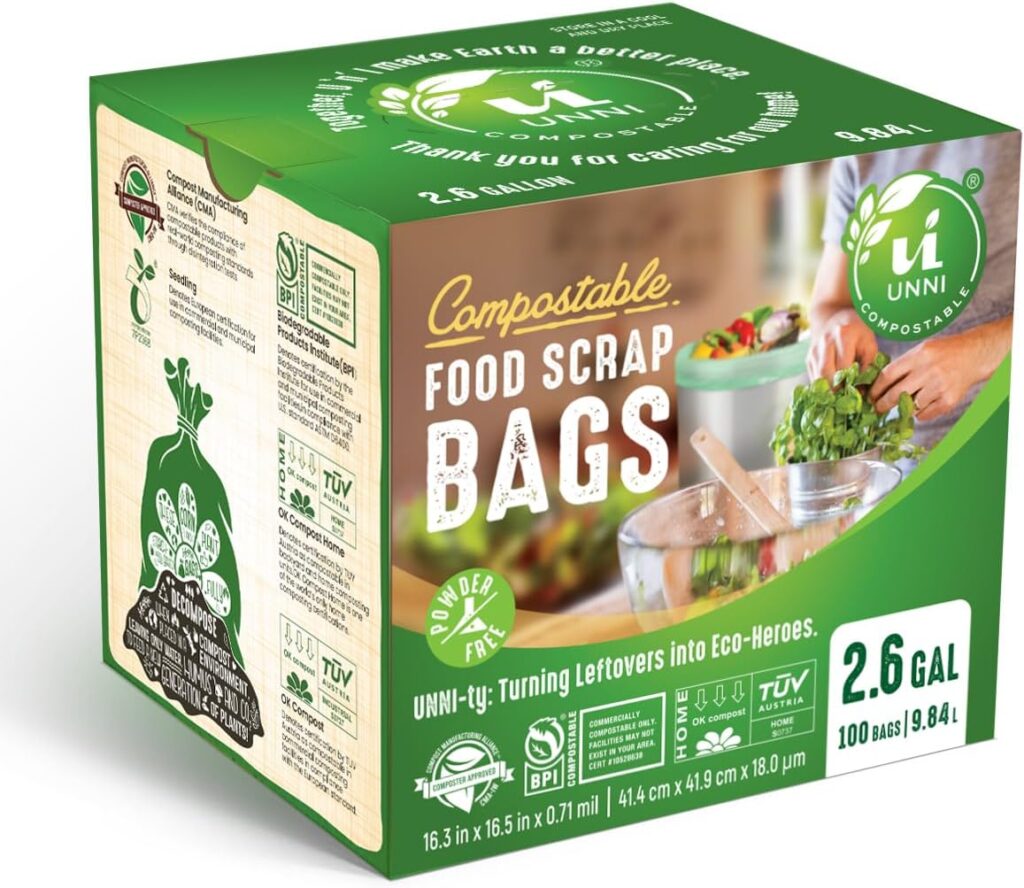
- Features: Made from plant-based materials, UNNI bags are 100% compostable and meet the highest standards for home and industrial composting.
- Pros: These bags are durable, biodegradable, and available in multiple sizes.
- Cons: Slightly thinner than regular plastic bags, so be cautious with heavy waste.
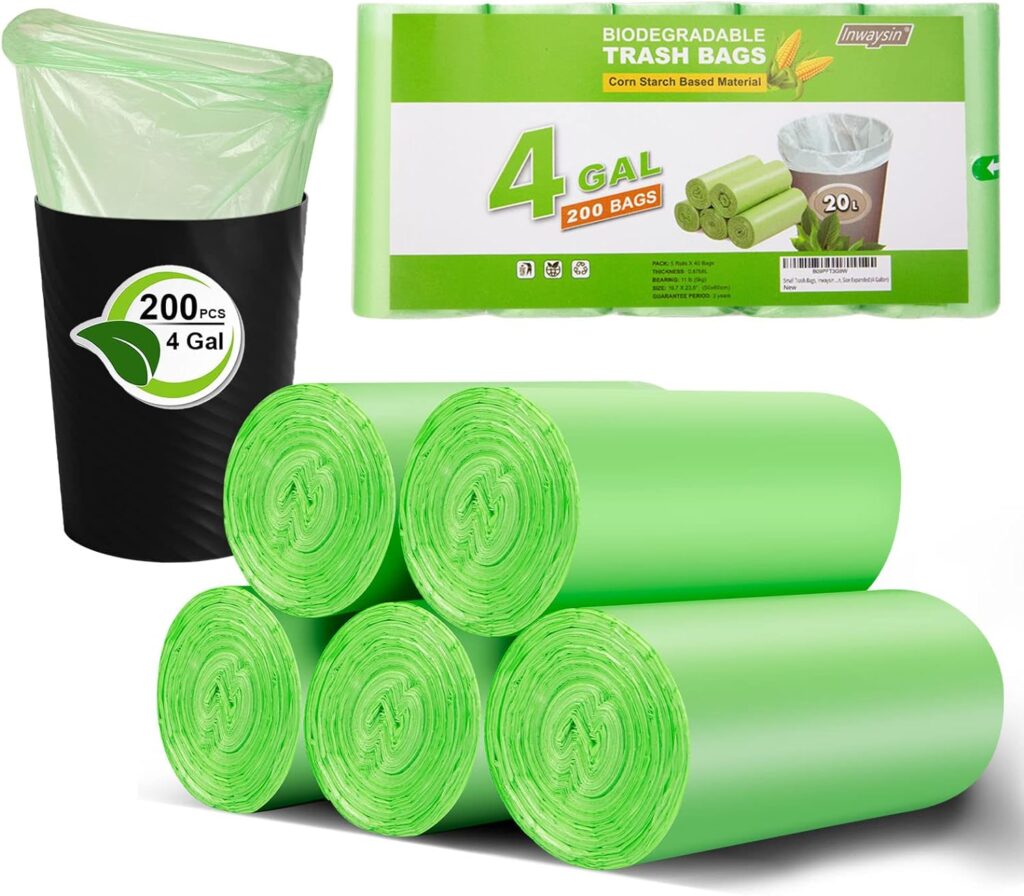
Inwaysin Biodegradable Trash Bags
- Features: These eco-friendly bags are made from cornstarch, making them fully compostable and biodegradable. They’re perfect for both home and commercial use.
- Pros: Affordable, strong, and break down within months under composting conditions.
- Cons: May not hold very wet waste as effectively as traditional plastic bags.
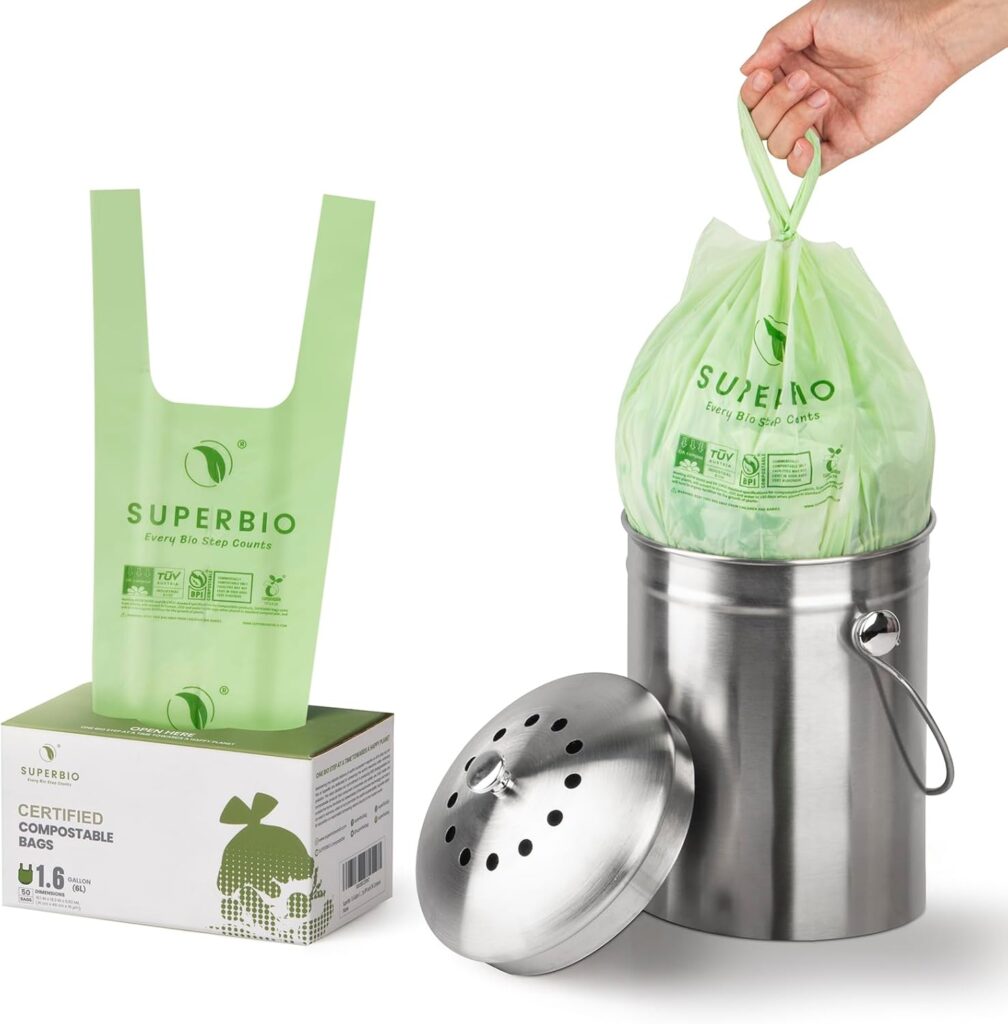
SUPERBIO Commercially Compostable Trash Bags
- Features: SUPERBIO bags are ASTM D6400 certified for commercial composting. They break down entirely within 180 days in an industrial composting facility.
- Pros: Extra strength makes these bags suitable for commercial use and larger volumes of waste.
- Cons: These are intended mainly for commercial composting, so they may not break down effectively in a home compost setup.
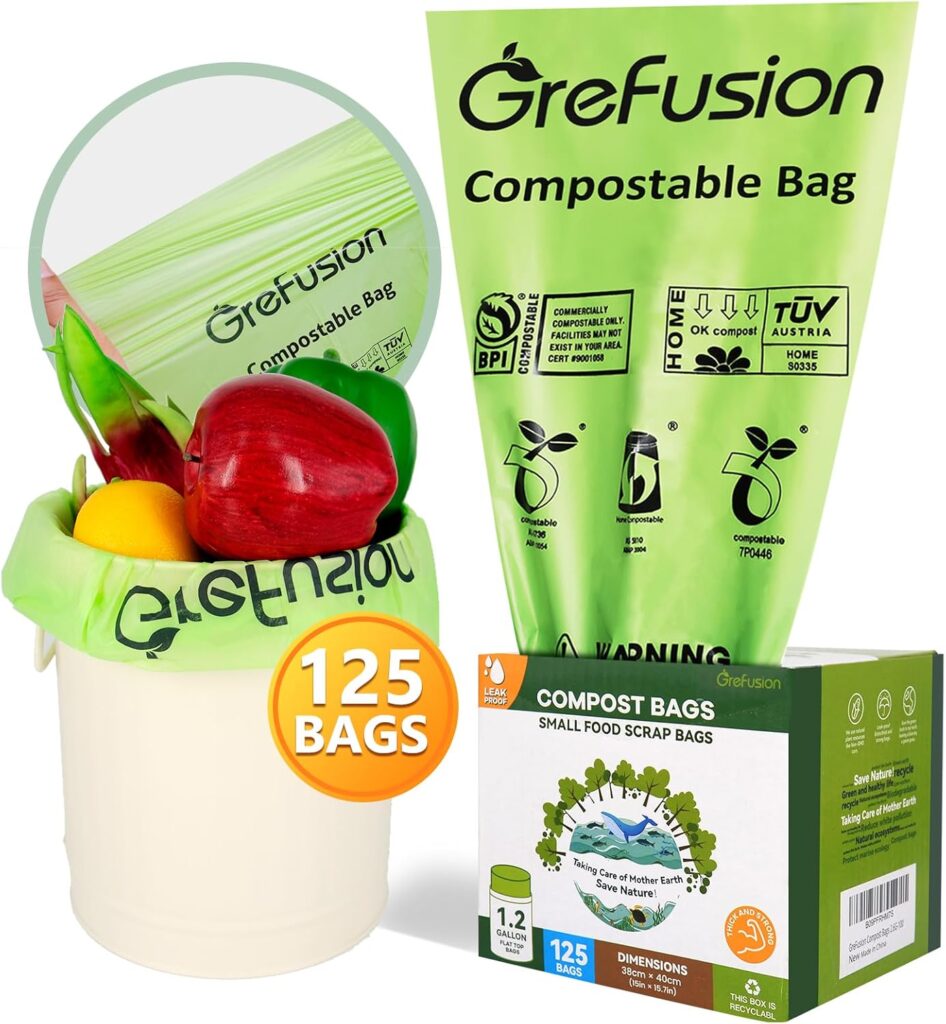
- Features: Made from biodegradable plant starches, Grefusion compostable bags are designed for home composting and general waste disposal.
- Pros: Sturdy construction with a reasonable price, making them ideal for households.
- Cons: Thinner than some competitors, so they may not hold up well with sharp objects.
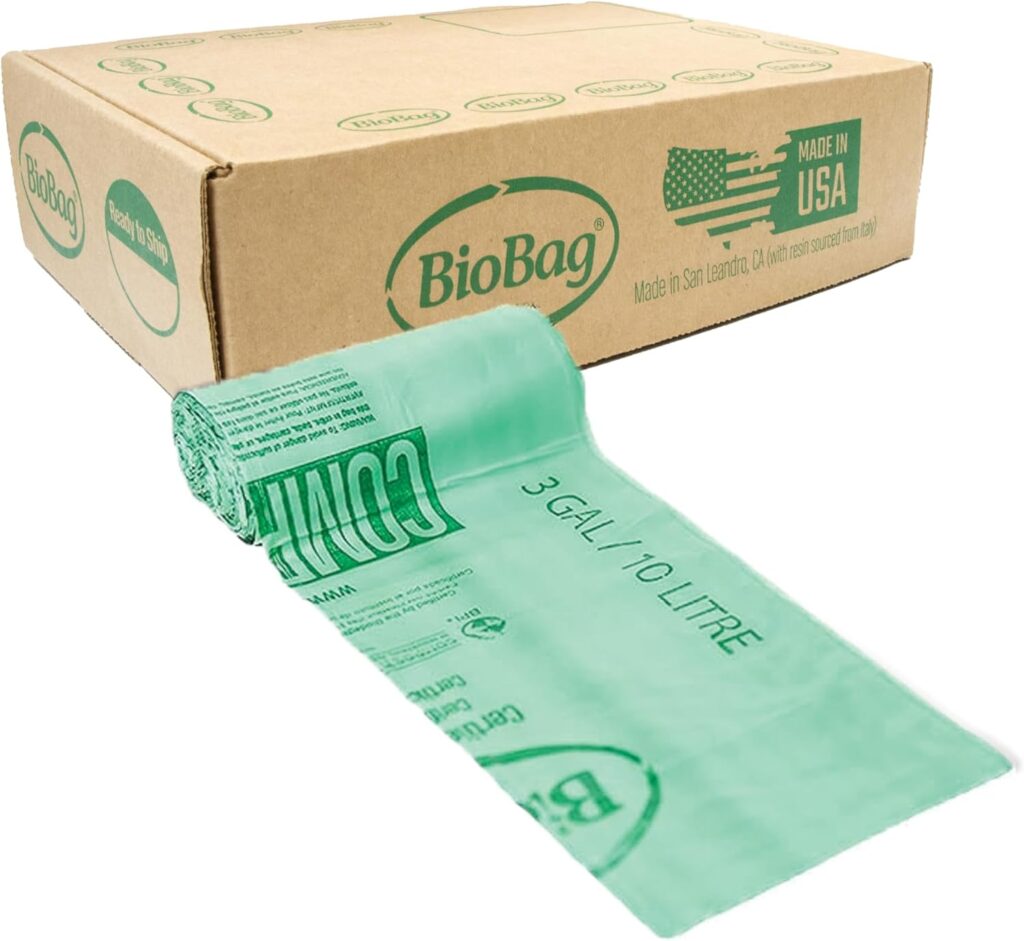
BioBag The Original Compostable Bag
- Features: BioBag is a pioneer in compostable bags, made from fully biodegradable materials. They are certified compostable for both home and industrial composting.
- Pros: Strong, leak-proof, and environmentally friendly. Available in various sizes.
- Cons: These bags can be more expensive than traditional plastic bags.
Conclusion: Make the Switch to Compostable Trash Bags Today
The switch from traditional plastic bags to compostable trash bags is a small change with a big impact. By choosing eco-friendly alternatives, you can reduce your plastic waste, support composting, and contribute to a healthier planet for future generations. With a range of durable and effective compostable trash bags available, there’s no better time to make the switch.
Affiliate Disclosure: Some of the links in this post are affiliate links. If you click on them and make a purchase, I may earn a small commission at no additional cost to you. I only recommend products I personally believe in for their quality and authenticity.
